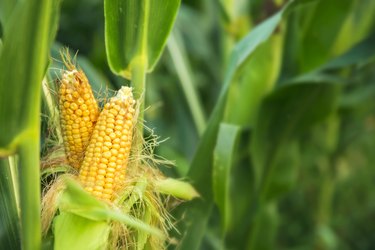
In the U.S., 92 percent of the corn produced is genetically modified, according to the Center for Food Safety. Much of the genetically modified (GMO) corn has been engineered to produce a soil bacterium called bacillus thuringiensis, or Bt, which is an effective insecticide.
Bt corn reduces pesticide usage, but many people are concerned about its effects on health and the environment.
Video of the Day
Video of the Day
What Is Bt Corn?
Bt corn or GMO corn is created by inserting a gene into the DNA of the plant that causes the corn to produce a protein called Bt delta-endotoxin, according to Colorado State University. The protein is lethal to certain crop-destroying larvae.
The U.S. Food and Drug Administration and the Environmental Protection Agency have determined that Bt corn is safe for humans, per the USDA.
Bt Corn Benefits
1. Insect Resistance
The way Bt acts as a pesticide is explained in one October 2003 article in the PLOS Biology journal. The bacterium produces a protein that breaks down the wall of the insects' gut, leaking bacteria throughout the body and causing death by septicemia (bacterial poisoning of the blood). Over 50 related genes have been found that destroy different insect pests.
Thanks to Bt, corn can now be grown where insect infestation previously destroyed harvests or required large doses of toxic pesticides pumped into the environment, often killing beneficial insects in the process.
Huge increases in crop yield, measured in extra bushels per acre, have been recorded. Bt corn starch, along with GMO soy lecithin, was used in 70 percent of processed foods in 2002, according to the PLOS Biology article.
One big environmental advantage of Bt corn is that it protects insects such as honey bees from lethal pesticides. This is important because honey bees are needed for crop pollination, according to the FDA.
2. Disease Resistance
Corn is subject to plant diseases, including fungi and bacteria. While all plants are susceptible to some diseases, some plants can resist diseases that attack others.
The article in PLOS Biology also points out that corn bioengineered to carry disease resistance contain lower levels of mycotoxins — substances produced by fungi growing on insect-infested, non-GMO corn crops.
Mycotoxins are potentially carcinogenic to humans.
3. Herbicide Resistance
Every home gardener and farmer knows that soil will grow weeds. Unfortunately, weeds have no commercial or nutritive value and they rob the soil of nutrients and sunlight from your useful crops.
Herbicides kill weeds, but few are selective. They can also damage agricultural produce, too. And when crops do resist herbicides, concern remains that some may be taken up and retained until people eat the food.
For example, glyphosate, which goes by the brand name Roundup, is an example of a weed-killing pesticide to which GMO corn has been made resistant, according to AgBioWorld.
GMO Corn Disadvantages
1. Endotoxin Allergies
Many scientists are not sold on the safety of GMO corn. While reducing pesticide usage is good for the health of consumers, the Institute for Responsible Technology points out that growing corn with Bt endotoxin means that you are eating pesticides with every bite of corn.
Bt corn has the potential to trigger an allergic response because the actual DNA of the corn has been altered, introducing new proteins into the food supply, according to the Center for Food Safety.
The EPA claims that Bt toxin has no adverse effect on humans or mammals, but a 1999 study in the journal Life Sciences found that when Bt toxin was given to mice, it caused high levels of antibodies, suggesting an allergic response.
The bottom line is that there are no long-term studies conducted on humans to either prove or disprove the safety of Bt corn.
2. Cross-Pollination
Bt corn can cause contamination of neighboring crops and this makes organic farming — which disallows genetic modifications — much more difficult, per the Institute for Responsible Technology.
Cross-pollination has already eliminated a large portion of heirloom varieties of corn. Plus, there is a potential for the Bt toxin to contaminate nearby streams and negatively affect aquatic life.